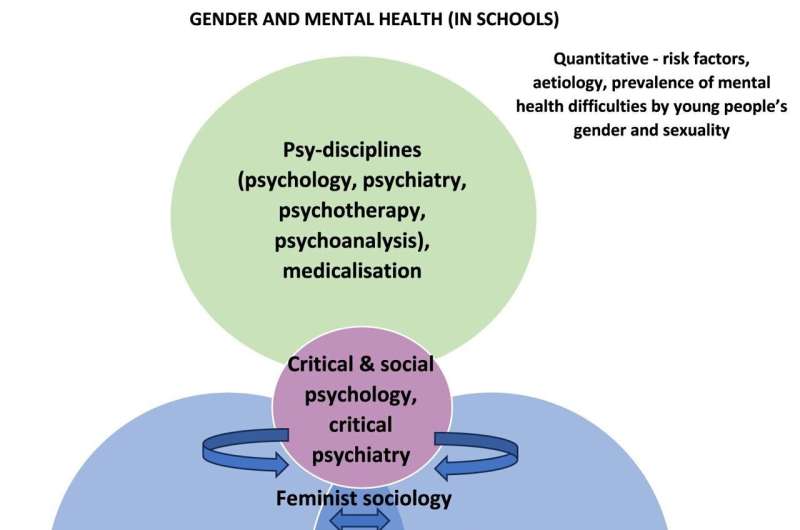This article has been reviewed according to Science X's editorial process and policies. Editors have highlighted the following attributes while ensuring the content's credibility:
fact-checked
trusted source
proofread
Gender stereotypes in schools impact on girls and boys with mental health difficulties, study finds

Gender stereotypes mean that girls can be celebrated for their emotional openness and maturity in school, while boys are seen as likely to mask their emotional distress through silence or disruptive behaviors.
Children and teachers who took part in the study said they feared the mental health needs of boys might be missed at school, which makes them an 'at risk' group. The study has been published in Educational Review.
Researchers have warned of the negative impacts on girls where the manifestation of emotional distress such as crying or self-harm could become "feminized and diminished," so taken less seriously.
They have called for increased awareness of the role of gender in mental health services offered in schools and resultant inequalities.
The study was carried out by Lauren Stentiford, George Koutsouris, Tricia Nash and Alexandra Allan from the School of Education at the University of Exeter. They interviewed pupils at two secondary schools in England to ask them, "Do you think that girls and boys experience mental health in the same way?"
One school was a mixed grammar school in a predominantly white, middle-class rural area and another was a mixed comprehensive school in a predominantly white, working-class urban area. The research took place in autumn 2022.
Researchers spoke to 34 students aged between 12 and 17. Seventeen students identified as female, 12 as male, and five as gender diverse. They also interviewed 18 members of staff, including a headteacher, school counselor, SENCO, and classroom teacher.
The majority—43 out of 52—felt girls and boys experienced mental health in different ways because of stereotypes that girls are open about their emotions, but boys will hide them.
One pupil, Willow, said, "Girls are more inclined I feel to talk to each other about [mental health] because we're not told to repress our emotions." Another, Kayla, said, "Boys just don't, they barely tell anyone anything that they don't want to talk about because they feel like they'll be looked at and be told the phrase 'man up' or 'boys don't cry.'"
The phrase 'man up' was referenced multiple times by different staff members and students in both schools.
Participants spoke of persistent and troublesome expectations that boys should not show their emotions.
Dr. Stentiford said, "There was a perception that girls are at an advantage over boys in receiving mental health support.
"Students and staff members tended to position girls as above boys in the hierarchy for mental health support because of their perceived emotional openness. Girls were seen as being more emotionally mature than boys and would actively look for help when they needed it.
"There was also evidence of participants understanding emotional distress as manifesting itself differently in girls and boys in school, with girls more likely to cry or withdraw, and boys more likely to engage in off-task or disruptive behaviors such as 'messing around' in class.
"The implications were that girls are seen as more likely to be identified quickly as in need of mental health support, whereas boys could be 'missed' because their disruptive behaviors are misinterpreted. Both girls and boys therefore remain 'trapped' in unhelpful gender stereotypes around mental health.
"The research suggests there is a new and emerging form of gender inequality, set against the context of a perceived growing mental health 'crisis' among young people.
"There are dangers around devaluing girls' well-being if 'emotional' girls are seen as unfairly advantaged and taking up time and support for mental health difficulties at the expense of boys, who are seen as particularly 'at risk' and a hidden problem."
More information: Lauren Stentiford et al, Mental health and gender discourses in school: "Emotional" girls and boys "at risk", Educational Review (2024). DOI: 10.1080/00131911.2024.2306947
Provided by University of Exeter




















